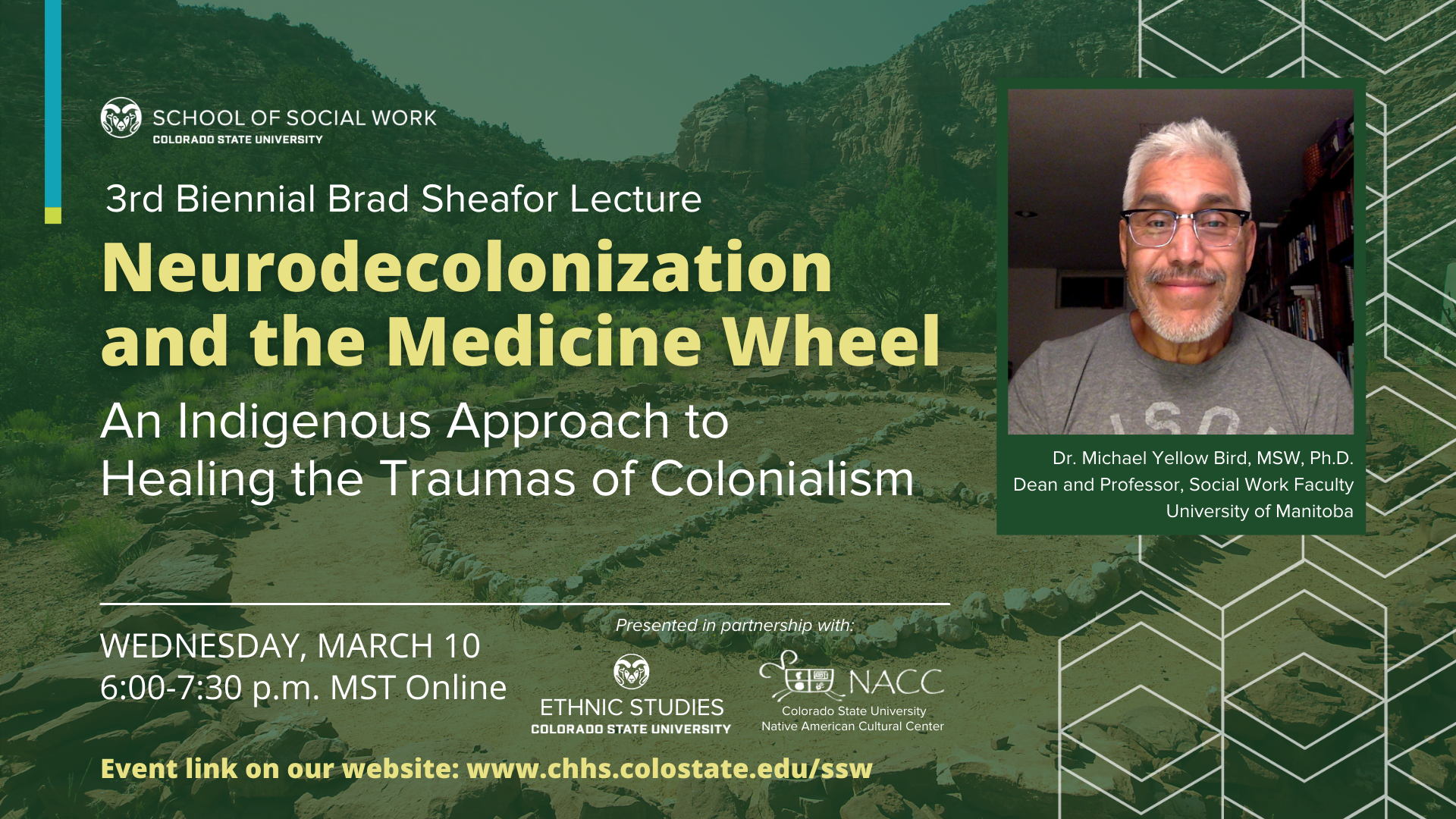By Aaunterria Treil Bollinger-Deters
As we approach the one-year anniversary of the World Health Organization (WHO) declaring the COVID-19 outbreak a pandemic, people across the globe have been compelled to reexamine various aspects of their daily lives. We are collectively adjusting to a new virtual “normal.”
One of the most prominent transformative conversations has focused on critically improving and maintaining quality mental-health care in these extraordinarily complex times of stress and isolation, especially for marginalized and vulnerable peoples.
Colorado State University’s School of Social Work, Department of Ethnic Studies, and Native American Cultural Center (NACC) are collaborating through mutual interests in education and communication to address and combat gaps in mental-health care, particularly among populations most impacted by structural oppression and collective social injustice.
Michael Yellow Bird to speak on neurodecolonization
On Wednesday, March 10 at 6 p.m., University of Manitoba dean and professor of Social Work Dr. Michael Yellow Bird will be the featured speaker of the biennial Brad Sheafor Lecture Series in Social Work. In the online presentation, Yellow Bird will explore mindfulness as a global tool of decolonization in “Neurodecolonization and the Medicine Wheel: An Indigenous Approach to Healing the Traumas of Colonialism.”
As an enrolled member of the MHA Nation (Mandan, Hidatsa, and Arikara) in North Dakota, Michael Yellow Bird’s research has a distinct and critical focus on the impacts of colonization on Indigenous communities and culture through multifaceted approaches to recovery from the traumas of colonization.
2021 Brad Sheafor Lecture in Social Work
“Neurodecolonization and the Medicine Wheel: An Indigenous Approach to Healing the Traumas of Colonialism.”
Presenter:
Dr. Michael Yellow Bird,
University of Manitoba
Virtual Lecture
Free and open to all!
WEDNESDAY, MARCH 10
6:00-7:30 p.m. MST
Click here to register for the event and receive a link to attend.
Presented by the CSU School of Social Work Brad Sheafor Lecture Series in Social Work, in partnership with CSU’s Department of Ethnic Studies and the CSU Native American Cultural Center.
Yellow Bird brings together Indigenous and Western evidence-based research and knowledge into the Medicine Wheel; a symbol used to represent wholeness, balance, and the natural cycles of life. This study brings mindfulness into all aspects of life, while also decolonizing pathways to healing within the social work framework.
Through neurodecolonization and mindfulness, Yellow Bird cultivates a space that facilitates critical thinking while also fostering discussions and meaningful action among communities reckoning with long cultural histories of generational trauma, colonial oppression, and institutional hierarchies.
Mindfulness as a precursor to institutional change
“I’m not the type of person to use mindfulness to make me better,” Yellow Bird said, emphasizing how mindfulness is not just for individual or community betterment. “These are structural issues.”
Through his mindfulness research, Yellow Bird discusses ways to “liberate our brains from fear” by engaging in active bodily movement and concentrated engagement: activities such as laughing, dancing, and singing. These activities positively alter our neurochemistry through emotions such as relaxation, pleasure, love, and happiness as well as decrease neurotoxins in our brains, which can protect and heal our brains from neurodegenerative illness and vulnerability.
For Yellow Bird, “decolonization of the mind” is the precursor to transforming the white supremacist institutions of oppression that continue to plague us. Mindfulness, Yellow Bird asserts, can decolonize our brains and enable people to intentionally and systematically remove the “shackles” of residual colonial imposition, such as racism, hate, and fear from the brain.
Yellow Bird is also the founder of the Centre for Mindful Decolonization and Reconciliation at the University of Manitoba, which organizes Indigenous and settler populations to work together to meditate and build empathy through mindfulness and reconciliation.
CSU’s Native American Cultural Center utilizes decolonization methodology
In recognition of the urgent need for Indigenous liberation strategies, Yellow Bird brings to the forefront a very necessary conversation about not only Indigenous liberation, but the methodology by which Indigenous communities can decolonize themselves.
It is this belief in Indigenous power, strength, and intelligence that enable the development of culturally specific decolonization approaches with which Indigenous groups can pursue their own emancipation. Here, the demystification of the language of colonization and decolonization aid Indigenous populations in identifying useful concepts, terms, tools, and intellectual frameworks in their precise struggles for self-determination.
According to Tiffani Kelly, CSU alumna and assistant director of the Native American Cultural Center at CSU, the center utilizes decolonization methodology and critical race theory in their North Star Mentoring Program curriculum; a program which creates community for self-identified Native American and Indigenous students through mentorship, outreach, reflection, support, and education on Indigenous histories.
In helping students learn what Indigenous mentorship is, the center also helps students answer complex questions such as: “what does it mean to be Indigenous in higher education”, how to “exist in a world that wasn’t meant for us”, how to “honor the land” and consider “place consciousness” that runs deeper than land acknowledgement, while also earning degrees that “aren’t just for us, they are for our people.”
This shared emphasis on community care, resistance, disruption, and mindfulness has inspired NACC to utilize one of Yellow Bird’s co-edited works entitled For Indigenous Eyes Only: A Decolonization Handbook (edited with Waziyatawin Angela Wilson) in past versions of the North Star Mentoring Program curriculum. Kelly says that though there have been multiple texts used within the course, questions raised within this handbook have helped shape how she thinks about community-based work.
Yellow Bird continues to enrich the world of Social Work through mindfulness through his research and writing. He is also the co-author of two recent books, A Sahnish (Arikara) Ethnobotany (2020) and Decolonizing Holistic Pathways Towards Integrative Healing in Social Work (2021) as well as numerous scholarly articles, book chapters and research reports.
